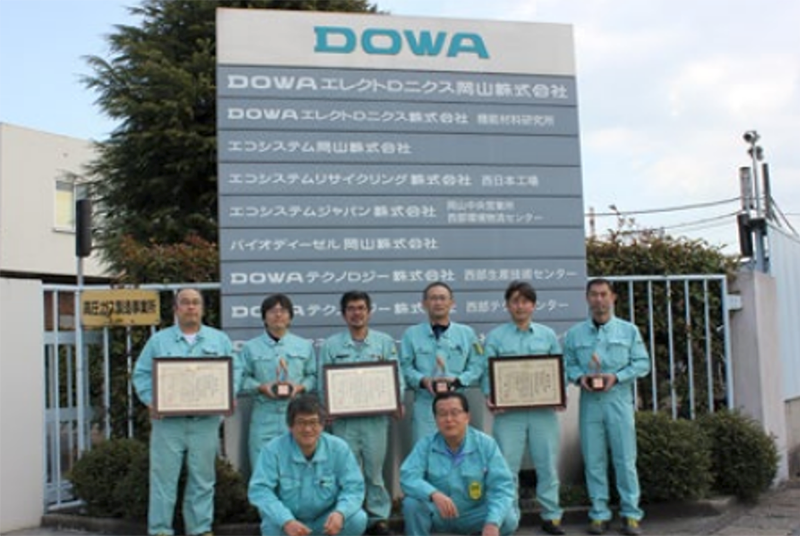ESG Library
Climate Change
Basic Approach
Climate change is a serious social challenge facing all industries and people worldwide. In light of the current global warming situation, we established the Climate Change Policy in August 2021. The DOWA Group addresses climate change from the perspectives of risk reduction and opportunity capture. By addressing climate change through both the reduction of our GHG emissions and the creation and expansion of products and services that contribute to society’s efforts to combat climate change, we aim to achieve a carbon-neutral society by 2050, leading to the sustainable growth of our Group.
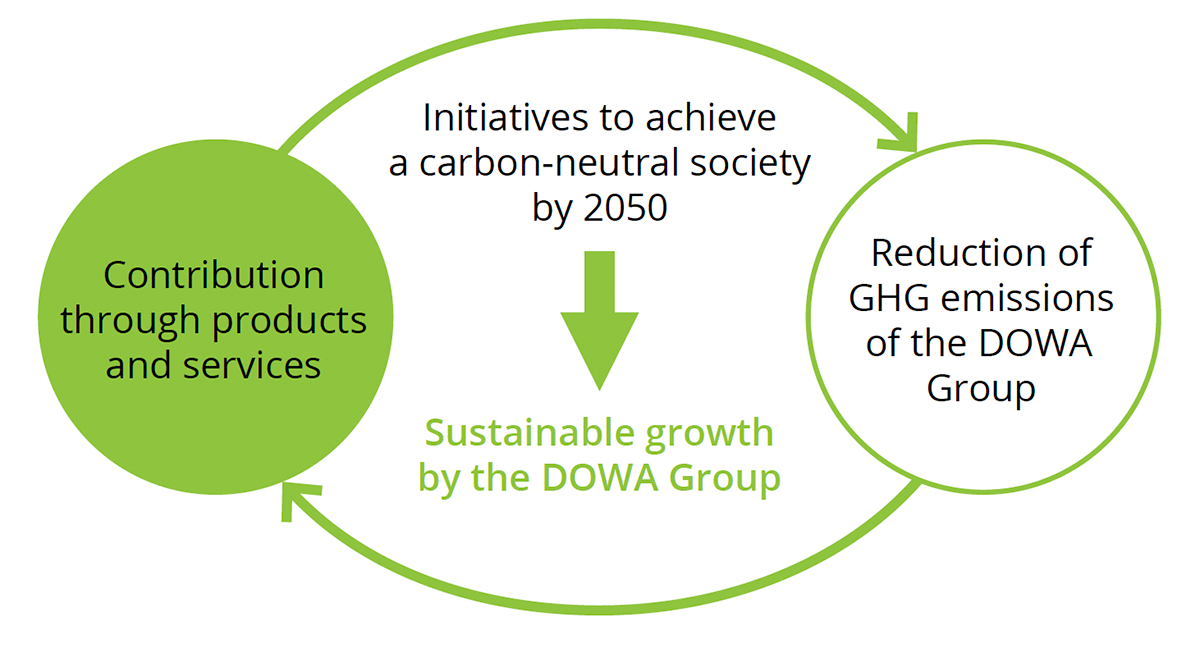
Disclosure Based on TCFD Recommendations
Under our Midterm Plan 2024, which began in fiscal 2022, we have designated addressing climate change as one of our materiality and have established a company-wide promotion system to promote activities aimed at achieving carbon neutrality by 2050. In February 2022, we reaffirmed our stance on climate change within and outside the Group by endorsing the TCFD recommendations. Based on the framework of the TCFD recommendations, we also conducted a scenario analysis and summarized the business risks and opportunities arising from climate change and published the TCFD Report in May of the same year.
Governance
In order to enhance sustainability-related activities, including those targeting climate change, the Group established the Sustainability Committee, which is chaired by the president and representative director, and under it the Sustainability Subcommittee, which is chaired by the director in charge of corporate strategy. The subcommittee identifies and assesses risks and opportunities presented by climate change, looking at the issue from a Groupwide perspective, and then investigates and formulates action plans, goals, and countermeasures, which it then reports to the Sustainability Committee along with any important risks and opportunities. The Sustainability Committee will deliberate on managing risks and opportunities related to climate change issues, and important matters related to management risks and opportunities will be brought to the Board of Directors for discussion and reporting. Upon receiving the agenda and reports from the committee, the Board of Directors will share issues related to climate change and discuss target management and solutions to these issues.
We have also established an organization specifically dedicated to promoting a response to climate change—namely, the Climate Change Response Working Group. This working group consists primarily of members from operating companies and members of the Technologies Department (DOWA Group Technologies Department, DOWA Technology Co., Ltd.) who work in the field, and it promotes initiatives that include reduction plans for GHG emissions and climate change monitoring systems.
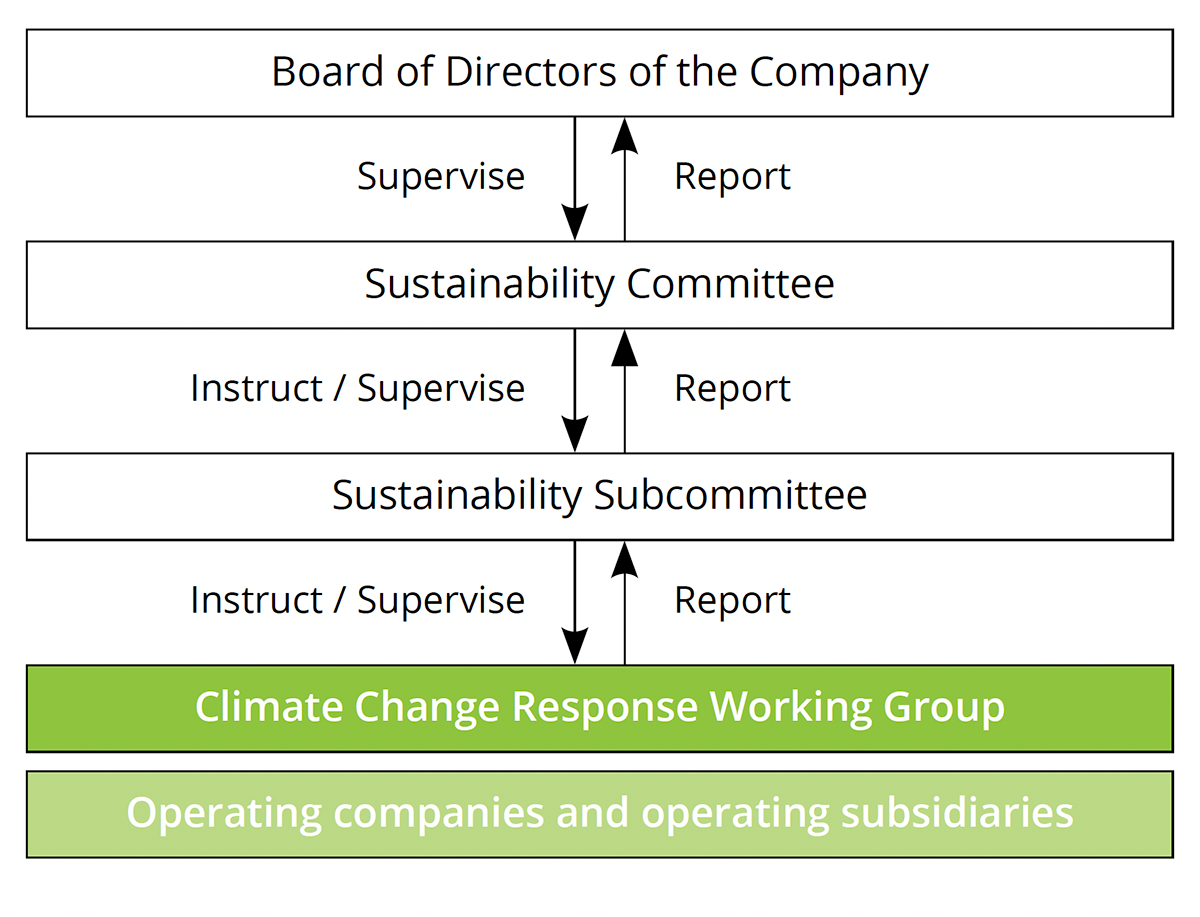
Strategies
In fiscal 2021, we conducted a scenario analysis targeting our domestic operations, which account for more than 95% of the Group’s total GHG emissions, and used the results to compile a series of risks and opportunities resulting from climate change. Since the forecasts are highly uncertain and difficult to analyze, we looked at multiple climate scenarios, ranging from 1.5 ºC to 4.0 ºC. We also identified, analyzed, and evaluated risks and opportunities relating to climate change on short-term (up to 2025), medium-term (up to 2030), and long-term (up to 2050) bases.
We Referred to the Following Scenarios

Risks, Opportunities, and Predicting the Future Business Environment
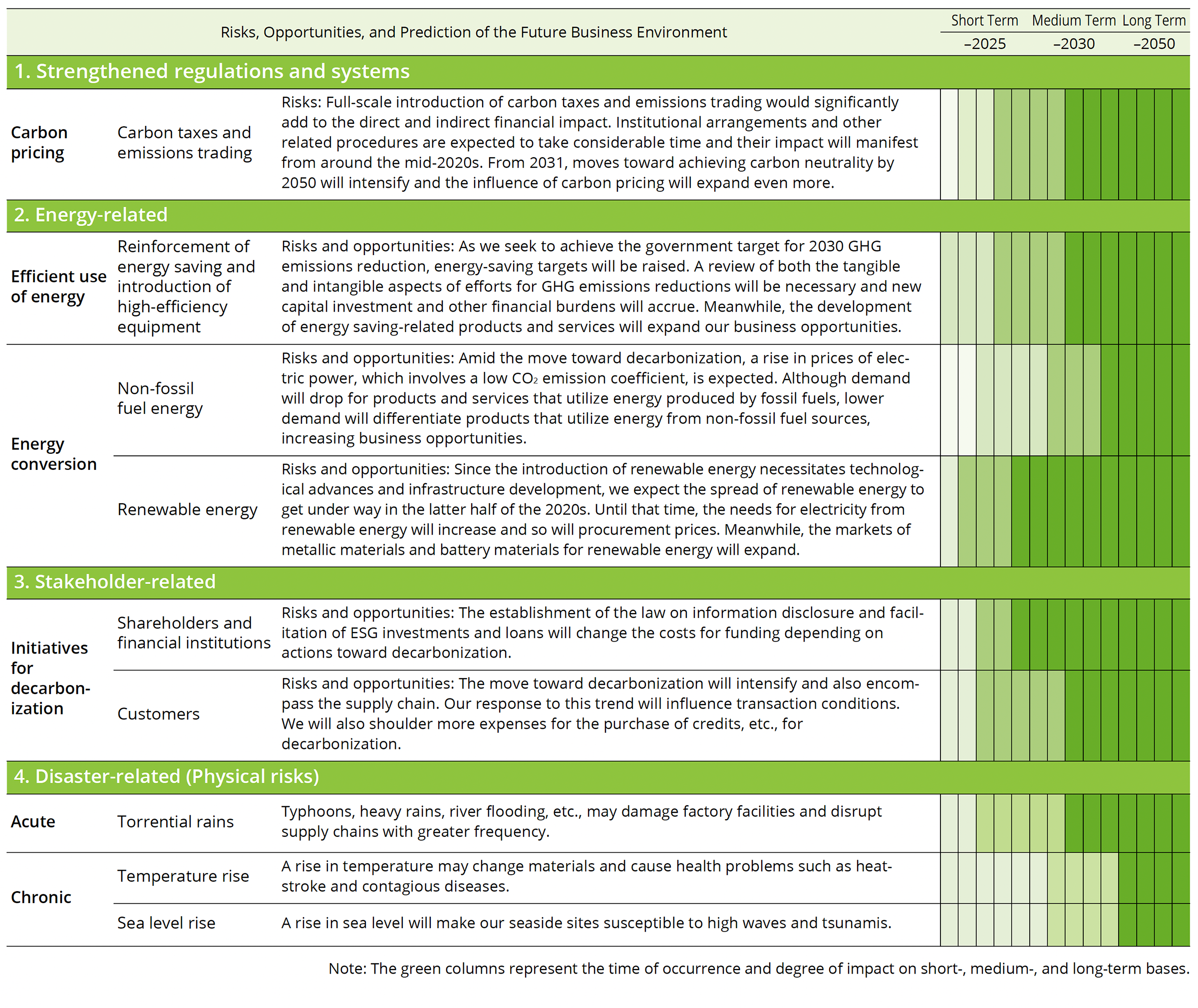
Situational Circumstances as of 2023
Starting in the second half of fiscal 2022, we have reaffirmed our situational circumstances regarding the social environment and our business based on the TCFD scenario analysis. Our confirmation has the aim of increasing the specificity of our mid-term measures to address climate change and the accuracy of our forecasts through 2030.
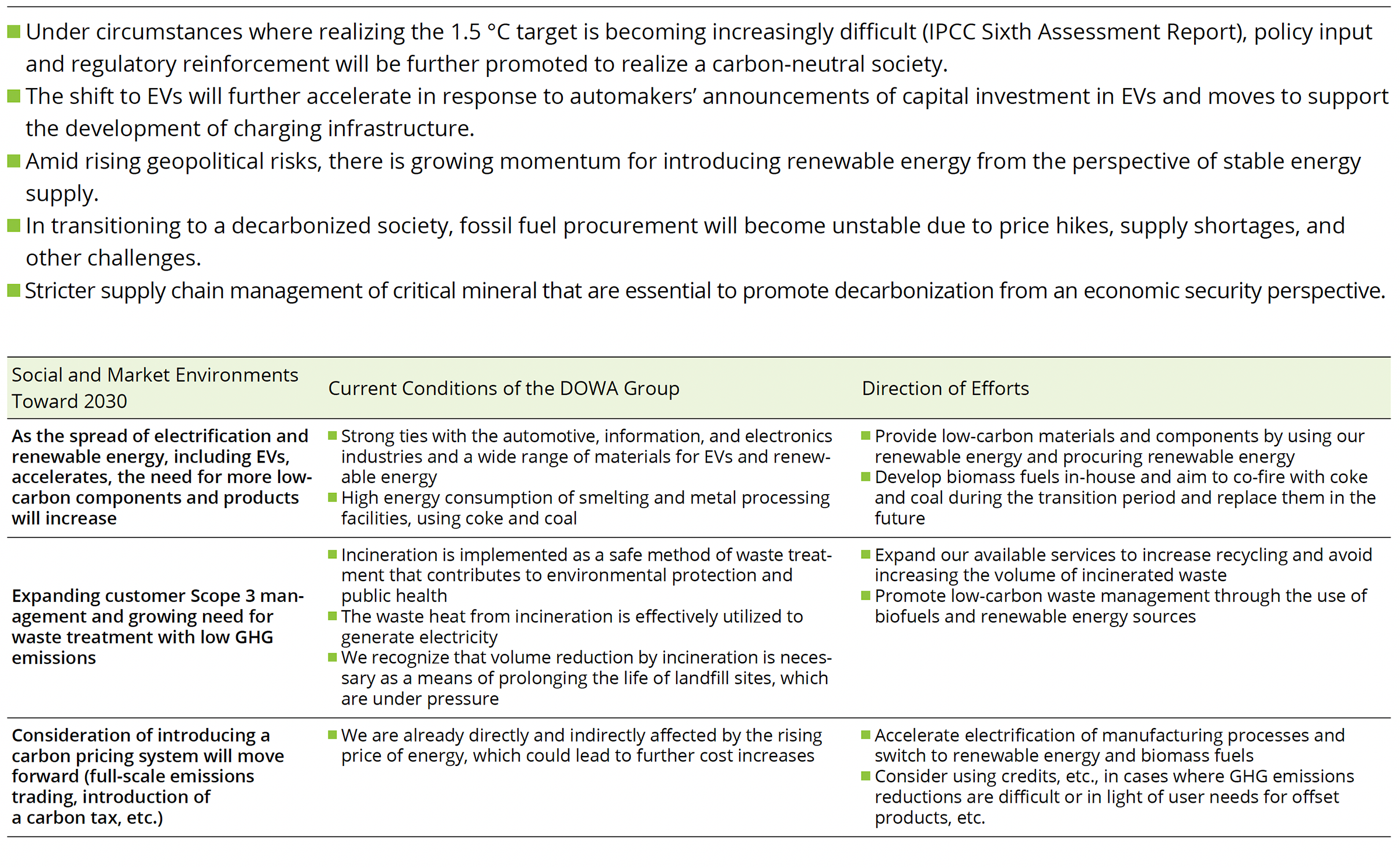
Noteworthy Market
As we identified the various ways that climate change could impact the DOWA Group, we paid particular attention to the automobile market due to the close connection to the Group’s main businesses and the major effect changes could have on the Group’s performance. From the perspective of a value chain, we analyzed changes in the automobile market resulting from the growing shift to electric vehicles (EVs) and identified the opportunities and risks for our business operations as shown below.
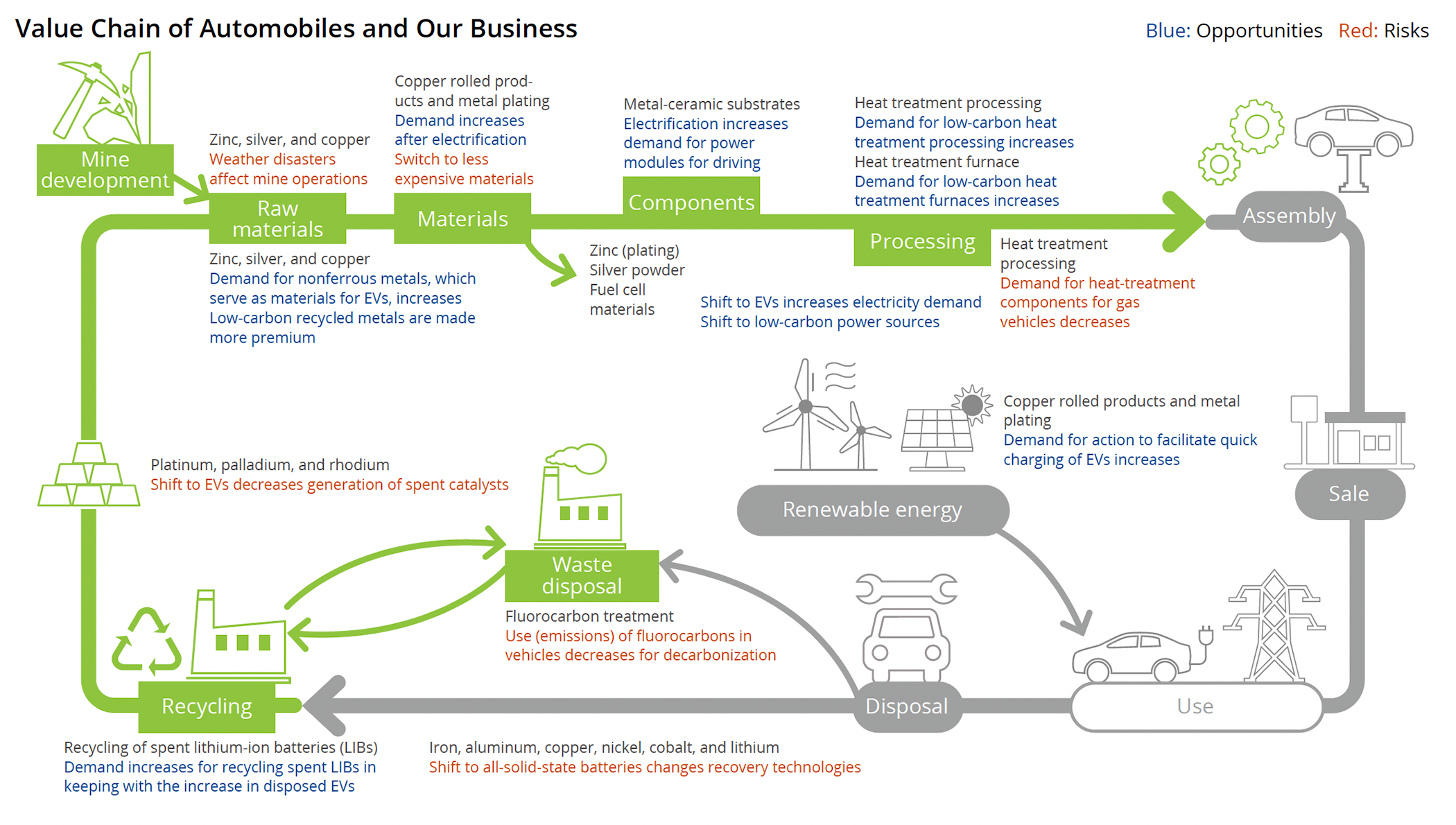
Risk Management
We have positioned risk management as one of our material issues. We strive to enhance risk management by establishing a system to appropriately manage and mitigate various risks arising through our business activities. Risk management related to climate change is integrated into the Group’s overall risk management.
Metrics and Targets
To achieve carbon neutrality by 2050 and to link our efforts to address climate change to the sustainable growth of the Group, we have set new contribution targets through products and services in addition to our interim GHG emissions reduction targets for the Group for fiscal 2030.
Long-Term Target
The DOWA Group aims to achieve carbon neutrality by 2050.
GHG Emissions Reduction Targets
The Group aims to be carbon-neutral by 2050 and, as a milestone, has set an interim goal of reducing Scope 1 and Scope 2 GHG emissions in Japan compared to fiscal 2013 levels by fiscal 2030, as shown in the table below. These targets are set in accordance with the targets for each category in the Japanese government’s Plan for Global Warming Countermeasures*, which was formulated to reduce GHG emissions in fiscal 2030 to 46% of the level in fiscal 2013. We are in the process of determining Scope 3 GHG emissions and will consider incorporating them into the target in the future.
* The Japanese government’s comprehensive plan based on the Act on Promotion of Global Warming Countermeasures (Cabinet decision on October 22, 2021)
GHG Emissions Reduction Target for FY 2030

Note: This target includes reductions through the use of credits and other means that represent Scope 1 and Scope 2 GHG emissions (CO2 equivalent) emitted by the DOWA Group in Japan.
Based on the above targets, the Group has set an emissions target of 1,200 thousand tons of CO2 for fiscal 2030. We will continue to monitor changes in social trends, technological innovation, and other factors and work toward further reductions from a medium- to long-term perspective.
This target does not cover GHG emissions from overseas business sites. However, we will consider setting a target as we proceed with understanding and monitoring the situation in the countries where they are located. The status of GHG emissions reductions will continue to be monitored. Targets may be revised as necessary, considering domestic and international policy trends and socioeconomic conditions toward decarbonization.
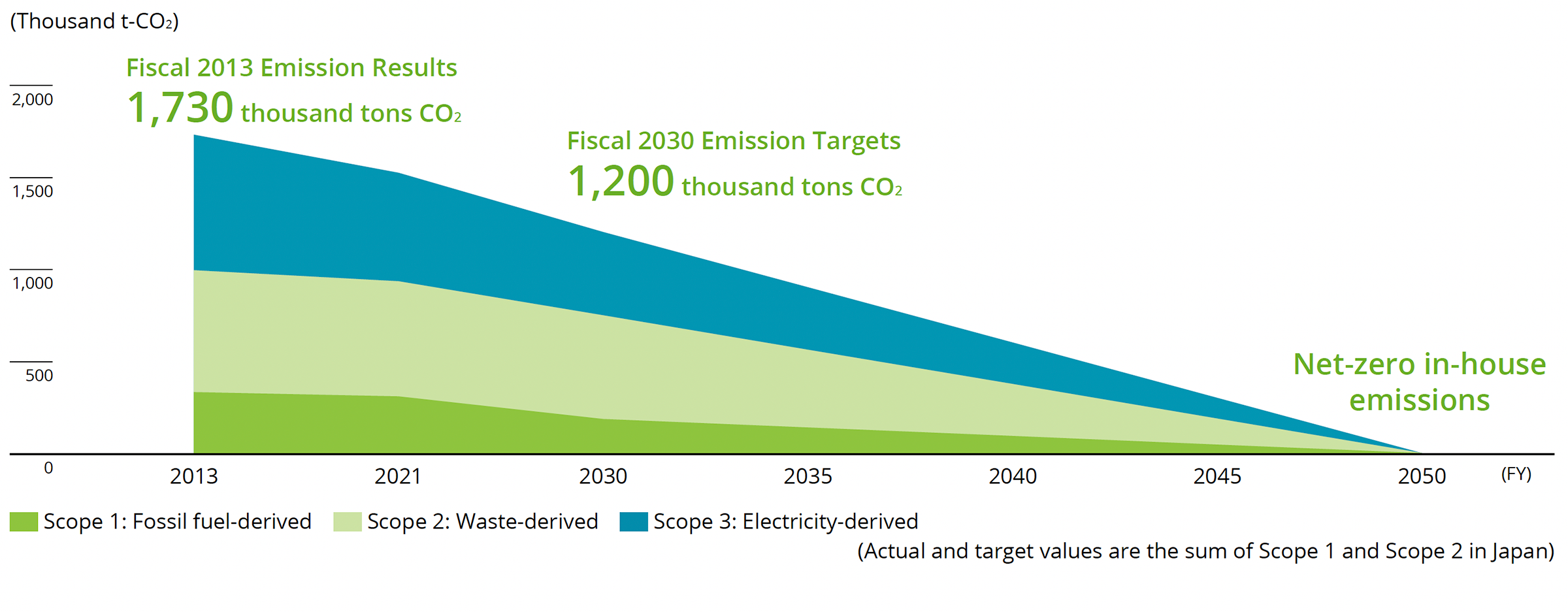
DOWA Green Action: Contribution through Products and Services
The DOWA Group provides a wide range of products and services contributing to society’s efforts to combat climate change. We offer many products and services to contribute to the reduction in GHG emissions through our supply chain, such as silver powder used for solar panels, which is indispensable for renewable energy metal materials for fuel cells and EVs, and the recycling of lithium-ion batteries and solar panels. We also provide society with non-ferrous metals, which are indispensable for the decarbonized society of the future, through our recycling-oriented business model that incorporates sustainable resource recycling processes, including recycling. We have named DOWA Group’s unique contribution DOWA Green Action (DGA) and have set targets for fiscal 2030.
Business Areas Covered by DOWA Green Action
Non-ferrous metals are essential materials for decarbonization technologies. We aim to achieve carbon neutrality by transitioning to a circular economy by reducing our own GHG emissions and providing society with a low-carbon resource recycling process. In setting targets for DGA, we identified two target areas: (1) providing materials that contribute to realizing a decarbonized society through resource recycling and (2) products and services that help customers and society cope with climate change. With this in mind, we identified applicable products and services.
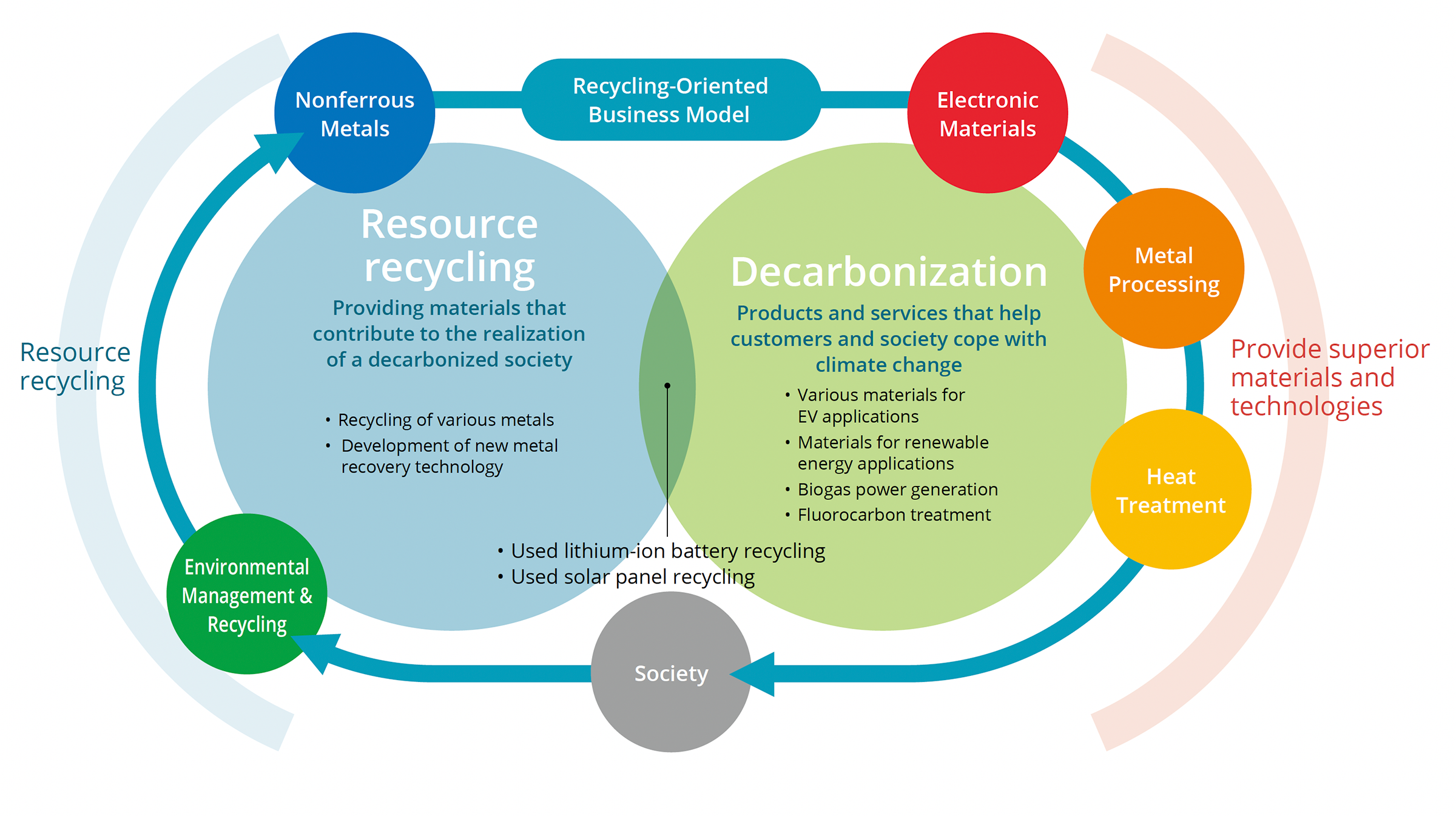
DOWA Green Action Targets for FY2030
By expanding the supply of DGA products and services and striving to develop technologies and create new businesses, we will contribute to the reduction of GHG emissions throughout society and work toward the realization of a carbon-neutral society. We set a sales target for DGA products and services as an indicator of these growth targets. As we advance, we will compile actual sales of DGA products and services each year to manage progress. To achieve our goals, we will steadily invest in growth in each of our businesses, as defined in our Midterm Plan 2024. We will also conduct research and technological development utilizing the ESG investment in our Midterm Plan 2024 to expand new DGA products and services.
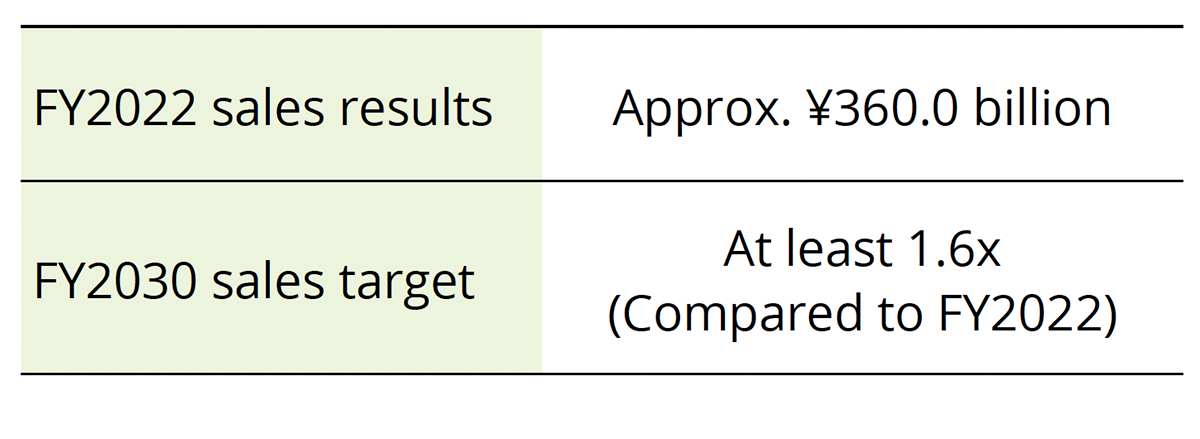
Examples of DOWA Green Action Initiatives
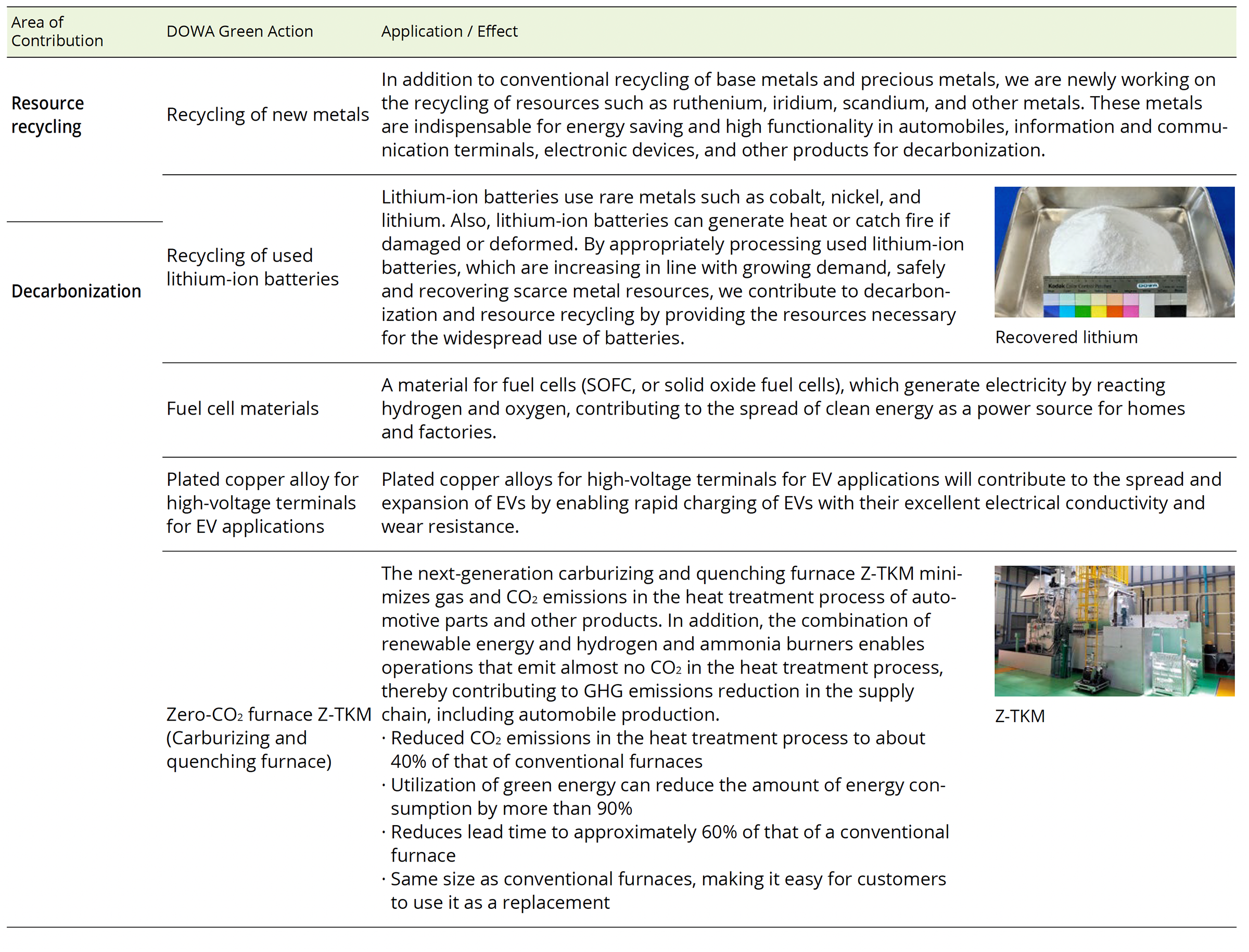
Amount of Contribution to GHG Emissions Reduction in Society through DOWA Green Action Fluorocarbon Treatment
CFCs, HCFCs, HFCs, and other fluorocarbons used as refrigerants in refrigeration and air conditioning equipment have a substantial greenhouse effect, ranging from several hundred to more than 10,000 times that of CO2, so proper treatment is essential. We have cooperated with the Ministry of the Environment’s Fluorocarbon Destruction Model Projects and have contributed to the establishment of fluorocarbonrelated legislation and the strengthening of regulations by conducting demonstration tests, etc., in cooperation with national and local governments. Currently, our Group contributes to reducing GHG emissions by more than 1 million tons (CO2 equivalent) per year, including fluorocarbons recovered and recycled from home appliances and fluorocarbons destroyed by thermal decomposition. In the destruction process, we perform thermal decomposition by waste heat from the incineration of waste materials without inputting new energy, thereby reducing our own GHG emissions in our endeavor to prevent global warming. We are also expanding fluorocarbon treatment in Thailand and other countries, which is expected to contribute to GHG emission reductions of more than 10,000 tons per year (CO2 equivalent) in a bilateral credit project supported by the Japanese government.
Roadmap to Achieve Carbon Neutrality by 2050
The Group will make maximum use of existing technologies and systematically introduce new technologies to achieve carbon neutrality by 2050. In addition to energy conservation, renewable energy, fuel conversion, electrification, and other measures, we will actively promote the in-house development of biomass fuels, ammonia burners, and other inhouse initiatives. In the future, we will encourage climate change countermeasures through multiple options, such as considering the use of negative emission technologies that capture and store CO2.
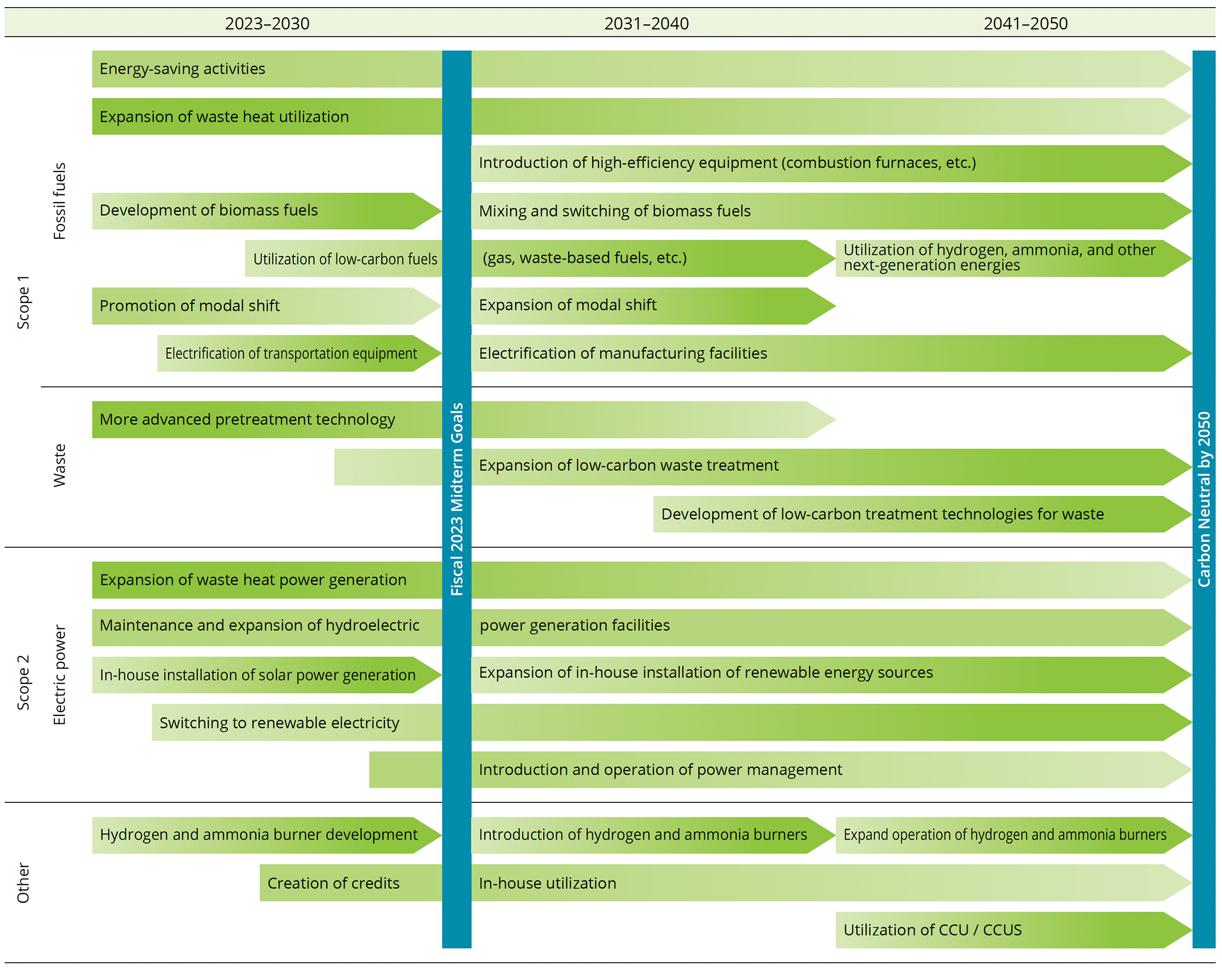
Achievements
The Group’s greenhouse gas emissions are characterized by the fact that they are primarily of electricity-derived and waste-derived, accounting for about 80% of total emissions. CO2 emissions are particularly affected by the incineration of waste received from outside sources, which varies depending on the amount and composition of the waste. Since it can be challenging to control waste generated externally, we are working to prevent global warming by promoting thermal recycling, in which the heat generated during incineration is used to generate electricity or steam. In addition, our manufacturing sites strive to reduce CO2 emissions by switching to energy-efficient equipment and reducing energy consumption through appropriate operational management.
Efforts Aimed at Reaching Targets
We will continue to promote energy conservation by improving processes and reduce greenhouse gas emissions by switching fuel sources and utilizing renewable energy in an effort to achieve the Group’s medium- to long-term goals.
Countermeasures under Midterm Plan 2024
Having started in fiscal 2022, Midterm Plan 2024 is aimed at enhancing our economic and social value simultaneously. For climate change, we have five key measures in accordance with our Climate Change Policy. In terms of business operations, we are committed to climate change initiatives that leverage the characteristics of each of our businesses, such as building a sustainable business model to achieve compatibility between resource recycling and decarbonization, with consideration of the analysis of TCFD-related risks and opportunities.
Climate Change Countermeasures under Midterm Plan 2024
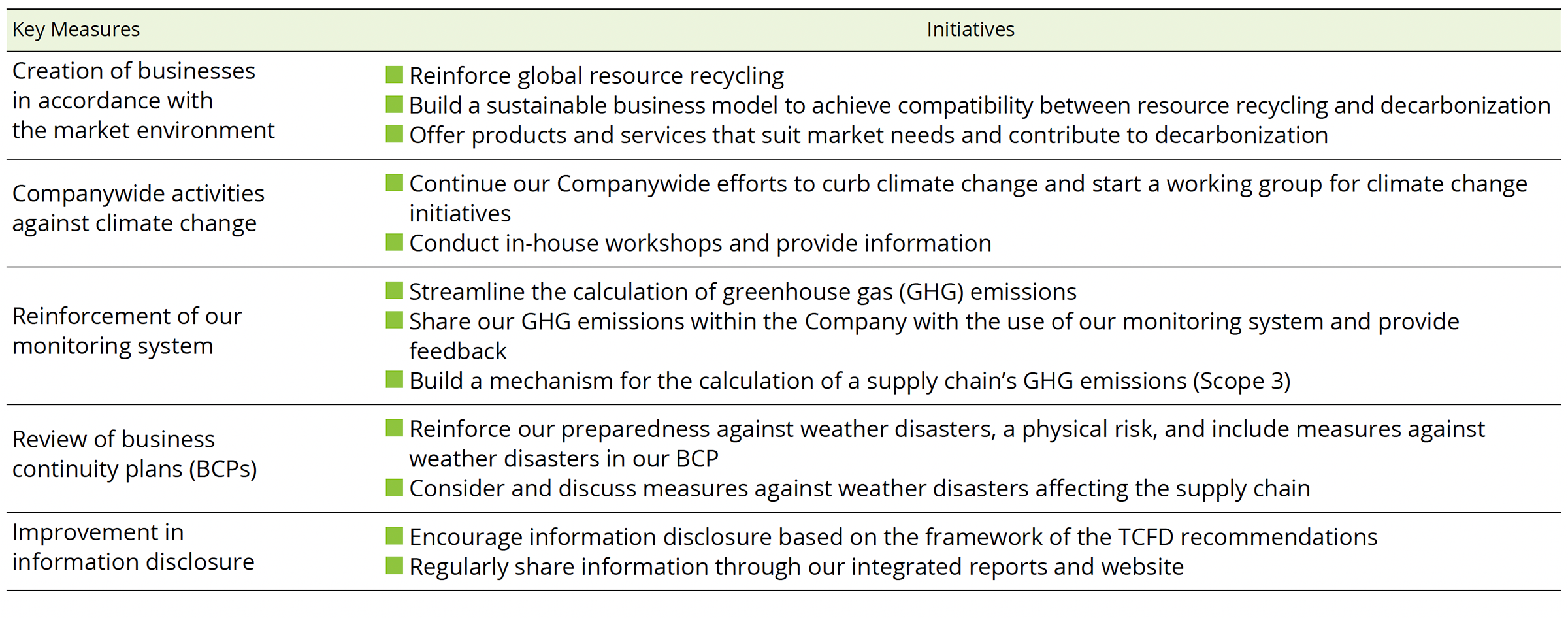
Utilization of Natural Energies
We are working to combat global warming through the use of in-house power generation from renewable energy sources and the promotion of renewable energy through our business.
Hydroelectric Power Generation
In 1897, the Company began operating Japan’s second hydroelectric power plant for mining development. Since then, the Company has continued to expand and upgrade its facilities as its business has grown, and it currently owns six hydroelectric power plants in Akita Prefecture. Making it an important energy source for Kosaka Smelting & Refining Co., Ltd.
Solar Power Generation
We are working to expand the use of renewable energy by installing solar power generation systems at six of our business sites in Japan and overseas. In addition to being used as part of the electricity required for business activities, some electricity was sold back to the grid.
Biomass Power Generation
We are working on biomass gas power generation from food waste in Okayama Prefecture.
Waste Heat Power Generation
The Group generates waste heat at six sites, five in Japan and one overseas.Waste heat power generation is a method that uses the heat from incinerating waste materials and exhaust heat from furnaces to produce high-temperature, high-pressure steam that turns turbines to generate electricity. Energy can be generated from waste, leading to the curtailment of fossil fuels.
Research and Development
Industry–Academia Collaboration: DOWA Co-creation Research Center
In April 2022, we set up the DOWA x Tohoku University Co-creation Research Center with the aim of bolstering our research activities with Tohoku University. The exceptional technological seeds at Tohoku University and the technology possessed by DOWA will be further integrated. The goal of this joint project is to create cutting-edge technology that will contribute toward offering resource recycling and excellent materials and technology while also responding to sustainability issues, including carbon neutrality. In the initial phase, from fiscal 2022 to fiscal 2024, we will explore the following themes and aim at launching collaborative research projects.

Bio-Coke
DOWA is conducting research on bio-coke, a solid fuel made from plants, for use as an alternative to the coke and coal used in its smelting and melting businesses. In 2021, we conducted a combustion test using various plant-derived raw materials and assessed the results. We intend to conduct preliminary and verification testing to promote development that will lead to actual manufacturing.

Climate Change Adaptation
As part of our response to climate change issues, we promote ”mitigation measures” to reduce greenhouse gas emissions, such as renewable energy and energy saving. In addition, we are also taking action in terms of ”adaptation measures”, such as disaster response and heat stroke countermeasures.
| Heat Stroke Prevention Measures |
|
|---|---|
| Weather Disasters |
|
Initiatives and Awards in External Organisations
Japan Mining Industry Association
We are a member of the Japan Mining Industry Association (JMA) and participates in the JMA’s specialized committees and subcommittees on climate change. The Japan Mining Industry Association has published “The Non-Ferrous Metals Industry’s Efforts to Achieve Carbon Neutrality by 2050,” and shares information with its member companies and collaborates with them in their efforts to achieve this goal. We regularly confirm that these industry associations are consistent with our approach and direction, and if there is any significant weakness or inconsistency, we will consult internally and with the industry associations and make adjustments so that our climate change strategy and activities with the industry associations are aligned.
Japan Climate Leaders’ Partnership (JCLP)
Dowa Ecosystem, the environmental business of the Dowa Group, has been a full member of the Climate Leaders’ Partnership (JCLP) since 2014. JCLP was established in recognition of the need for industry to develop a healthy sense of urgency and take proactive action to achieve a sustainable decarbonized society JCLP is an economic organization unique to Japan. By leading the transition to a decarbonized society, we aim to become a company that is sought after by society.
Energy Conservation Grand Prize Award (Okayama Prefecture)
In January 2022, the DOWA Group’s Okayama site received Energy Conservation Grand Prize 2021, sponsored by the Energy Conservation Center, Japan with the financial support of the Ministry of Economy, Trade and Industry.The Okayama site is made up of nine Group companies and organizations that conduct different types of business, and each company and organization is focused on conserving energy. In 2018, the companies and organizations at this site came together to form a project team because of this common focus, with the goal of the total optimization of energy usage across company lines. The team directed its efforts toward the heating and cooling demands of each company’s equipment and worked on implementing heat exchange between companies. As a result, it achieved a reduction of 4,324 tons of CO2 in the three years since the team was established.
